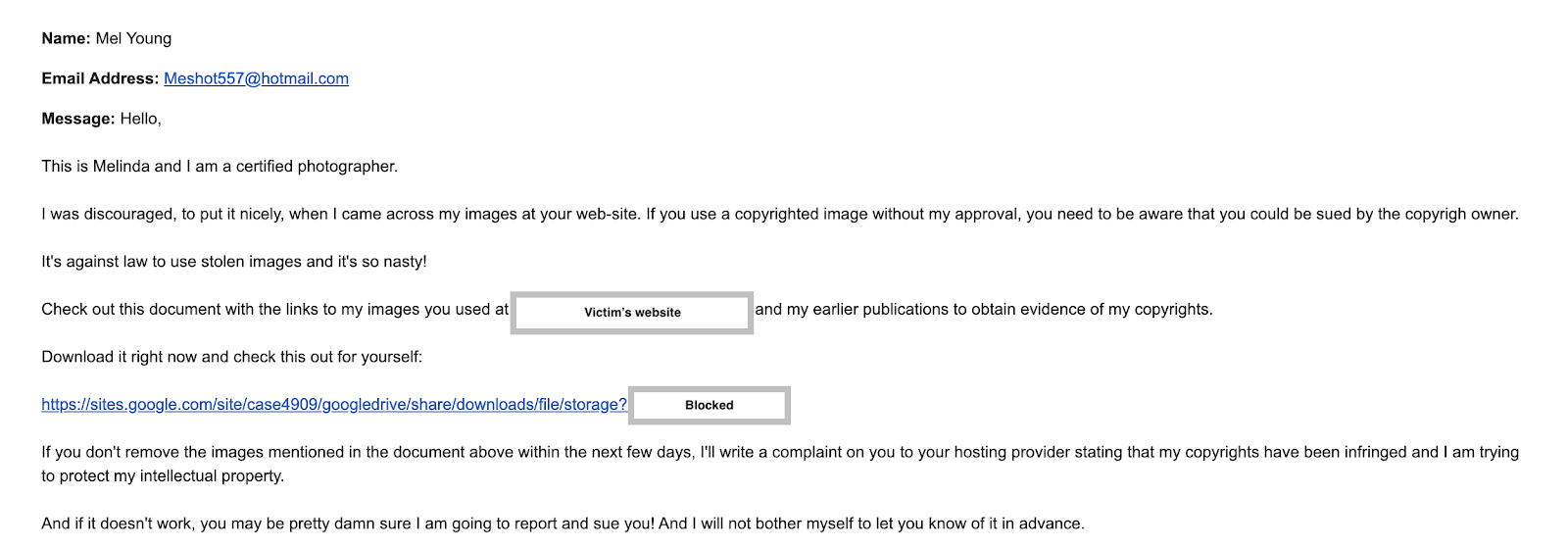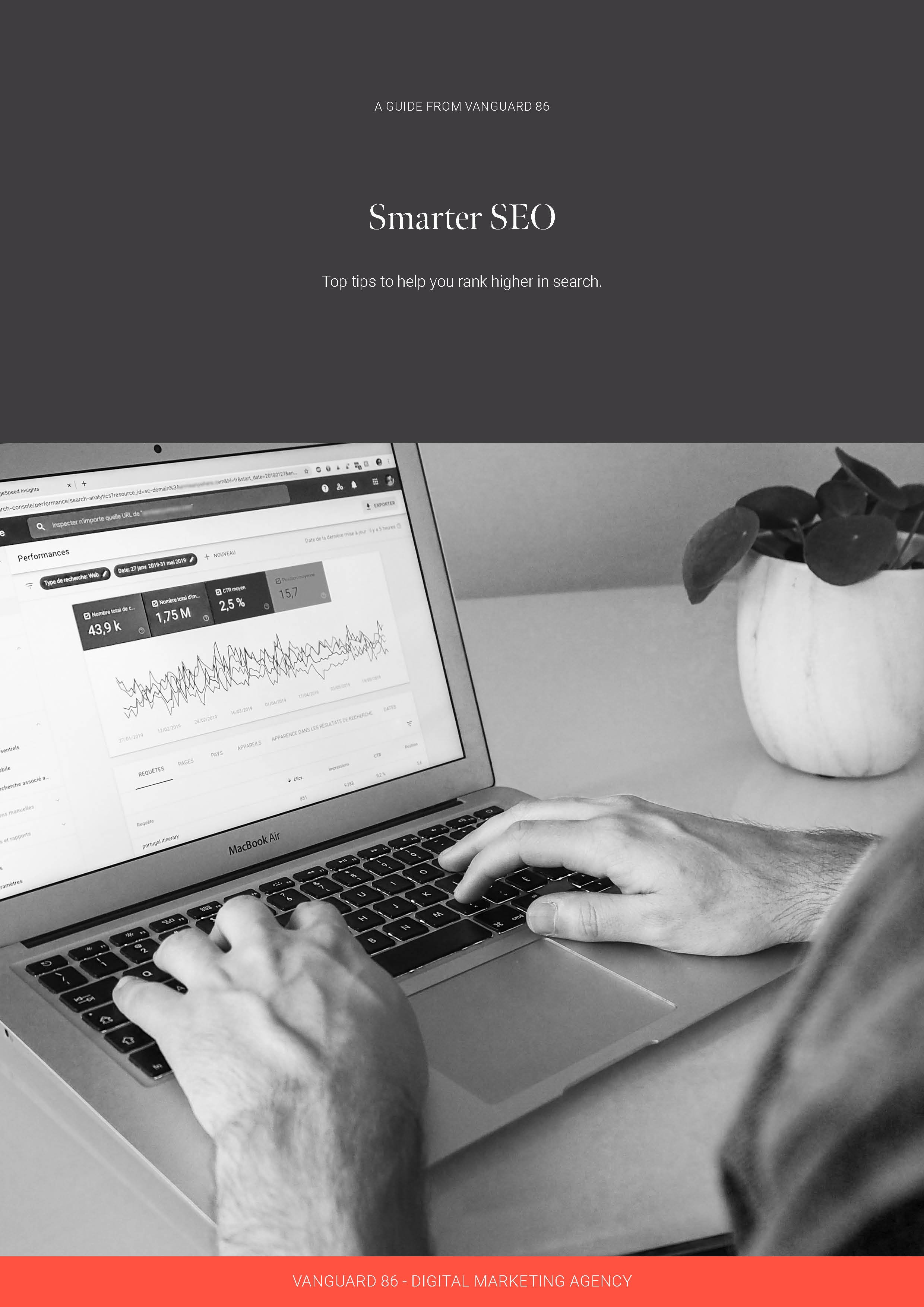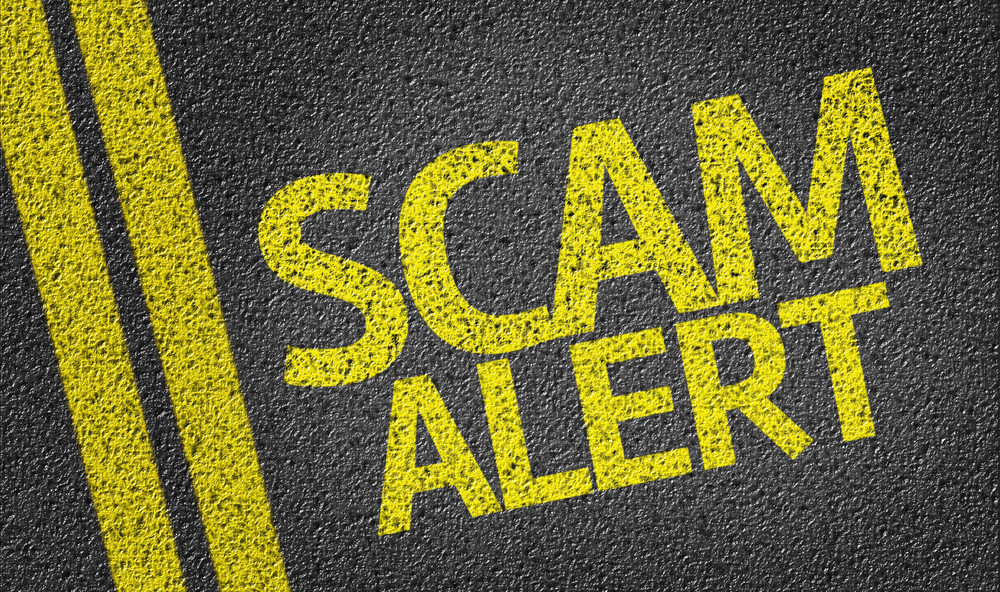Image licensing scams explained
In the past few months, we’ve seen an increase in scammers reaching out to businesses asking for payment due to the unlicensed use of copyright images. This can be on their website, in blogs or on social media posts.
This appears to be part of an elaborate scheme to extort money from unsuspecting businesses, many of them small and unaware of complex things like licensing laws. The scammer preys on this lack of knowledge and the financial impact of seeking sound legal advice on a business already struggling with the impacts of COVID-19.
In an attempt to combat these predatory practices we wanted to highlight a few of the hallmarks of a scam email so that you might be able to avoid falling into their trap.
What’s this scam about?
In the examples, we’ve seen a emails come through a website form or directly to an inbox explaining that an image or images, being used by the business are owned by that individual and that they breach the owner’s copyright. The message often goes on to explain that simply removing the image isn’t enough and that they demand compensation for its improper use.
In alternative versions of the email, there are attachments or links to documents where the recipient can obtain permission to continue using those images for free.
Both are variations of the same theme - scare the recipient into taking urgent action without considering the facts or consequences. In the former, there’s a financial motivation behind the scam while the second is more elaborate and provides a mechanism for the scammer to infect the computer with a virus, likely to result in monetary extortion at a later date.
Below are real-life examples of such emails.

And here’s another one:

As you can see they are reasonably similar and bear all the hallmarks of a scam email - a few of which we’ll outline below.
How do you know these are scam emails?
Copyright infringement is a real problem and all too often a business will simply grab an image from the internet and use it without thinking of the consequences. In those situations, the copyright owner has every right to contact you and insist on its removal. In the second example, our agency had been responsible for sourcing the images in the blog identified so we knew that the correct permissions were in place.
Even though the second email is arguably the more sophisticated of the two there are still some tell-tale indicators that this is a scam. Let’s go through a few of them.
Vague and inaccurate
In the second line of the email, the scammer highlights that if the image was sourced from one of the legitimate free stock image sites listed that there’s no problem. They’re hedging their bets because all free images on those sites come with licensing that enables you to use them in blogs, on websites and for promotional purposes. If using such sites their ruse doesn't have a leg to stand on.
Their gamble is predicated on the recipient not knowing where the image was sourced from.
Savvy recipients of this scam will simply ignore it as it’s clear the scammer isn't sure where the image was sourced from. If pressed the recipient can simply say they did source the image from one of those sites. The scammer has inadvertently given the recipient a get out of jail free card.
Suspicious details
Another tell-tale sign is the email signature of the second email. Not only does it contain an unsubscribe button (which is usually only seen on mass emails) but there’s no branding or links to a legitimate company.
Never click on any link in a suspicious or unsolicited email, instead jump into Google and search for the business using any names or URLs provided. This person claims to be representing a client, so you’d expect them to be from a law firm or existing business of some repute. Yet a search of the company name brings up nothing. A search for Ricardo Dunham in Linkedin also brings up no results.
This scammer’s email address itself looks official, it was ricardo@genomesalon.com, which is an important detail when we analyse the next email. However, there’s no such web address for genomesalon.com which indicates this to be a fraudulent company. Remember to never click on any links in an unsolicited or suspicious email.
Inconsistent details
Many of these scams rely on you not thinking clearly to work. They’re hoping you’re panicked and flustered or that you care so little that you don’t check the details, in fact, many rely on such circumstances to even stand a chance of working.
I remember once receiving a cold call from a chap saying he was from my virus support company and that a hacking attempt had been detected on my desktop PC. He assured me they’d prevented the attack but he wanted to walk me through changing a setting via remote access to prevent future attacks. When I mentioned that I owned a Mac laptop, not a desktop PC he hung up realising that he’d been rumbled. Often scammers will give themselves away.
In the first email, we can see a story developing that has a few holes in it. Firstly, she says she’s a certified photographer (you don’t need a certificate to be a photographer) and that she’s incredibly protective of her intellectual property. If she’s so proud of her work and certification status then why doesn’t her email signature include a link to her website or an example of the certificate? We proudly display our Google partner status and HubSpot partner accreditation in our signatures! She’s also using a very forgettable email address, so she’s clearly not that keen on establishing a brand or owning the intellectual property of her own name.
There's also some excessive embellishment within her story. how they missed out on the Pulitzer Prize we'll never know.
Exaggeration
It’s common for positive scams to be viewed with caution because it’s easy for something to seem too good to be true. I’m still waiting on my $360m from that Nigerian prince from back in 2004.
Modern scams definitely lean towards the dire consequence scenario, although this doesn't mean you shouldn't remain cautious of anyone requesting quotes or requests for proposals (RFPs) through suspicious links as well. In both of these examples, the punishment for infringement seems worse than any reasonable person would expect. In any normal circumstance, the copyright owner will simply want you to stop using the images but in both of these examples things have inextricably gone beyond that point and that’s no longer enough.
In the first one, the scammer is going to attempt to have your entire website removed from the internet if you don’t comply. If multi-billion dollar movie companies struggle daily to have websites illegally streaming their movies removed then I’m interested to see how Mel’s attempts go. Sadly, even if this was a genuine copyright infringement the DNS provider wouldn’t be able to shut down the website from an email request from the affected party.
Even in the second one, the consequence of using the image has gone beyond its simple removal and now you must display a designated link forevermore.
In reality, removing the infringing material often does fix the issue. If someone notices that you’re infringing on their copyright the first step is for them to ask you to remove it if you fail then you’re liable for legal action. But if you comply with their wishes you’re no longer infringing and there's no action to take.
The sorry truth
While our clients and contacts were able to double-check with us the validity of these types of email the sad reality is that many small businesses will become victims to these types of scams. As a small business owner, you have enough to deal with without ambushes from people lacking the imagination to get real jobs or create their own legitimate businesses.
Businesses have been held to ransom by similar scams. We knew of a business that needed to pay $10,000 to get their client database unlocked and then spent $10,000 again replacing their computers due to the infection that clicking a link had placed.
If you’re worried about this scam, or others, here are a few simple rules you can follow:
- If you’re not expecting it treat it with caution
- Don’t have plain text email addresses on your website
- Have a friend or colleague check over the email
- Don’t forward or click any links
- Google the company or person
- Google for known scams similar to the one received
- Source all stock images from licensed sources (Unsplash, Pexels, Canva etc)
And remember the golden rule of suspicious emails: Don’t click, don’t forward, don’t reply!
For further reading on how to spot a scam or understanding the tactics scammers will employ check out these helpful sites:
Stay safe and ensure all images you use in your digital marketing have the required licensing to stop yourself falling foul of real copyright infringement laws.
But...
On the flip side of all this is the very real penalties for using imagery that you do not have permission to use. Jumping on a Google image search, downloading an image and using it on your website is likely to land you in hot water. Remember, just because an image is online doesn't mean it's free for everyone to use.
Using the previously mentioned stock image sites reduces your chance of infringing on someone else's copyright. If you're hiring a photographer make sure their contract has in writing that you, and only you, have the rights to use the images you've paid for.
New Zealand does not have specific laws protecting you from someone using your image online without your consent. But you should confirm with your photographer, before the work is undertaken, that you have the image usage rights for the work you're hiring them to do. We've seen situations where a photographer has withdrawn the right for a client to use imagery they paid to have taken.
In New Zealand's 'handshake economy' things don't always go wrong, but when they do it can often be quite extreme. Images may need to be removed from the website and even printed brochures binned, often at a significant cost.
The moral of the story is that it's better to be safe than sorry. Get everything in writing and if you don't have it in writing assume you might need to remove the image/video at some stage in the future. Work with reputable professionals; something that's cheap now might cost a small fortune in the future.
Download your free guide to Smarter SEO
Good SEO can mean the difference between your business being found, or you being lost in the growing mass of online resources. This guide is designed to help you rise above your competition.
Download now




